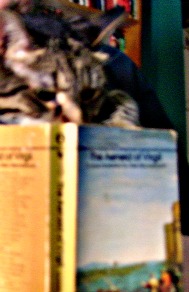News, Night's Black Agents
Call of Chicago: A Sort of Sortilege
In Bram Stoker’s original Notes for Dracula, we find the following cryptic line:
Lawyer – (Sortes Virgilianae) conveyance of body
Stoker originally thought perhaps the “lawyer” character Peter Hawkins, mostly written out of the book, would perform the sortes Virgilianae, literally the “Virgilian lots,” to find out how his new client would work out. Both pagan Romans (who thought poets divinely inspired) and medieval and early modern Christians (who found a prophecy of Jesus in Virgil’s fourth Eclogue) considered Virgil a prophet. The sortes Virgilianae thus refers to a form of bibliomancy in which the querent randomly opens a copy of Virgil’s Aeneid (or sometimes the complete works of Virgil) to receive prophetic guidance on some venture.

- Sortes Virgilianae Virgilianae *INCEPTION sound*
The “conveyance of body” seems like Stoker’s legalistic joke on the dual meaning of “conveyance”: both transportation and transfer of property rights. Anyhow, the phrase points us at Book VI; line 530 of the Aeneid (Dryden’s translation):
“My boat conveys no living bodies o’er”
Which pretty neatly prefigures the doomed Demeter’s voyage from Whitby, which is why I put it right back in Dracula Unredacted.
Later on in the Notes, Stoker suggests maybe Harker performs sortes Virgilianae in Dracula’s library, or discovers that Dracula has been using this medieval magic system, or perhaps Seward does it while feeling blue and neurotic. Eventually Stoker tossed the whole idea. But you don’t have to!
The Bibliomancy Option
Either in your Dracula Dossier game or in a Bookhounds of London campaign it can be creepy fun to introduce a bibliomantic element. The trick, of course, is to pre-load the prophecy. Go to one of the many searchable Aeneids on the Internet and search for the thing you want to show up in the next session.
Gutenberg has the whole poem on one page, and you can search for word fragments (searching on “blood” finds “bloody”); Bartleby has line numbers if you value such things or want to add a numbers-code feeling, but the poem pages are broken up by books so you can use only whole-word searches from the main page.
Or genuinely randomize it: Roll a d12 to select the Book and then a d2000 (d20, d100) to pick the Line (count a 20 result on the d20 as 0). In Dryden’s translation, no Book is longer than 1400 lines, so prepare to re-roll that first die a lot. If you’re more digitally minded, John Clayton’s Two random lines from Virgil does just that, but does not yet support a search.
Then, when the characters decide to sort out a sortilege, you can spring the right creepy line on them. Or, you can read the whole poem looking for naturally awesome couplets like this (Book II; lines 212-213):
“Reveal the secrets of the guilty state,
And justly punish whom I justly hate!”
And then come up with a neat scene that tag can retrospectively be seen to have predicted. Characters that bring about or otherwise invoke that prophecy can claim an Achievement-style 3-point refresh, if you’re feeling generous.
The following perhaps-magic item can appear in either sort of campaign, but it’s written up for the Dracula Dossier.
Hawkins’ Aeneid
Appearance: An copy of Virgil’s Aeneid, in Latin and Dryden’s English translation, on facing pages, with numbered lines. Octavo, bound in pale yellow buckram, published by “Faelix Press, London, 1864.” It gives every appearance of heavy use; many pages are marked with pinpricks or brownish ink checks. It is autographed on the frontispiece, “From C. to ‘Mr. P.H., the onlie begetter.’”
Supposed History: This was the copy of the Aeneid used by Peter Hawkins to cast the sortes Virgilianae during the 1894 operation. Art History suggests the inscription is a literary joke, after the dedication of Shakespeare’s Sonnets to “Mr. W.H., the onlie begetter.” The inscription implies that “P.H.” created Edom, and hints that his real initials are W.H. “C.” might be “Cyprian” Bridge, Director of Naval Intelligence, or the not yet officially on the clandestine books Captain Mansfield Smith-Cumming, or someone else entirely.
Major Item: The book allows the accurate casting of sortes Virgilianae, with a proper knife (the Jeweled Dagger (p. XX) or something from the Knife Set (p. XX) perhaps). Riffling through the book and striking a page at random reveals a line or two of Virgil that provide prophetic insight or warning into (usually) the next session’s events. (This lets the Director think a little about how best to work the prophecy in.) During that session, each forewarned agent gains 1 pool point that can be assigned retroactively to either Sense Trouble or Preparedness.
Minor Item: This is indeed Hawkins’ desk copy of Virgil, but it only provides possible leads to Hawkins’ identity or that of his mysterious supervisors in the murky prehistory of British intelligence. Whether either clue points to the current “D” or anywhere else in Edom is up to the Director.
Fraudulent: It’s an authentic 1864 edition of Virgil, but has no connection to Hawkins or to Edom.
Connections: Could turn up in the library at Ring (p. XX) or the Korea Club (p. XX), in the Exeter house (p. XX), or if meant as a clue to the real “Hawkins,” on a dead GMC, with his finger pointing to lines 870-871 of Book II:
“Make haste to save the poor remaining crew,
And give this useless corpse a long adieu.”


